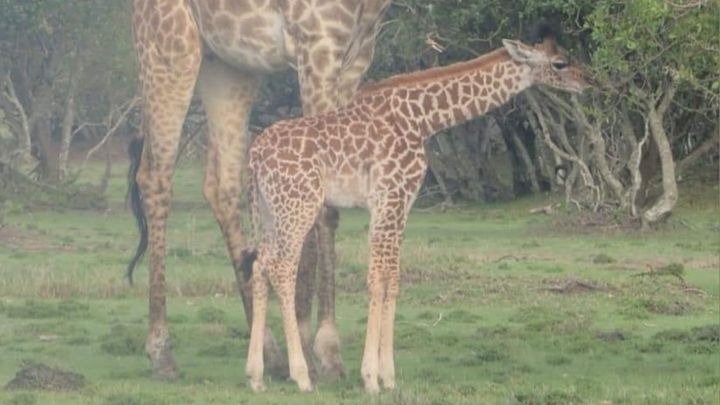
GIRAFFE SOS ON THE MASAI MARA!
Tax deductible
SOS: Kenya's Giraffes Need Your Help!
Written by Melissa Bahleda,
LNN Research Volunteer
Over the past few years, I have had the privilege of assisting Life Net Nature with their giraffe research and conservation efforts on the Siria Plateau. The Plateau sits above the Masai Mara, an essential wildlife reserve and ecosystem that sustains over one-quarter of Kenya's remaining wildlife. Home to many of Kenya's big cats and elephants, the Mara is a critical core area for Kenya's biodiversity and conservation efforts. It protects the northern grasslands that sustain the Great Migration, which occurs annually between the Masai Mara and the Serengeti in neighboring Tanzania. The migration of wildebeests and other hoofed mammals has been deemed one of the Seven Natural Wonders of the World. Tourism to the Masai Mara area in Kenya contributes to preserving the culture of the Maasai people who live around the national reserves and in various conservancies.
Currently, the Oloirien Maasai lands on the plateau above the Mara are not protected. Long inhabited by the Maasai people, the area has also been utilized, perhaps for centuries, as a giraffe birthing ground. Pregnant giraffes who give birth in the Mara often lose their newborns to lions or hyenas. Some of these mothers-to-be have learned that, due to the proximity of humans, there are fewer predators on the Plateau, and therefore it is a safer place to give birth and raise their young. It is very likely that this female "giraffe knowledge" has been passed down from generation to generation.
Unfortunately, westernization has also reached the Plateau. Once communal, the Maasai property at Oloirien has recently been privatized and is being sectioned off and fenced in. These fences have had a deadly effect on wildlife, and most especially on the giraffes, who likely follow remembered routes to birthing and feeding areas with ample acacia and other food appropriate for baby giraffes. Most of these routes are now blocked, sometimes repeatedly, by significant fencing, including electrified wires and framework substantial enough to block elephants. Panicked and awkward on their long legs in the face of these unfamiliar obstacles, adult male and female giraffes can become entangled during encounters with the new fences. Baby giraffes are even more vulnerable.
In recent months, several giraffes have been caught in fences and killed. Mothers have been separated from babies, resulting in orphans, and just last week a newborn giraffe was likely electrocuted after repeatedly running into a fence trying to reach her mother. These deaths are unnecessary, but even more devastating may be the effect this will have on the entire giraffe population in the area, as the Plateau serves as an important source of giraffes for the Masai Mara. If these accidents and fatalities continue unabated as new fences continue to appear, the already endangered species may be extirpated in this northwest part of the Masai Mara-Serengeti ecosystem.
But we are not without hope. Life Net has a dedicated group of Maasai conservationists on the Siria Plateau who are willing to assist. Our goal is to raise $20,000 by the end of summer (summer in the US), which will allow us to employ a number of our Maasai associates to patrol the fences and identify problem areas. These associates have long established relationships with local landowners and Kenya Wildlife Service, and your donations would allow them to have more eyes on the ground ... and on the fences ... giving us a strong possibility of preventing future giraffe fatalities and providing veterinary assistance more quickly when needed. Part of the funding will also go towards having the team trained to administer wildlife first aid until professional help arrives.
Giraffe populations across Africa are threatened by development, habitat loss and climate change. Your generosity can help ensure that the giraffes of the Masai Mara have a future while we work to address other threats to their survival.
About Life Net: Life Net Nature empowers local people to advocate and conserve endangered species in high biodiversity regions. Life Net Nature works at the grassroots level doing community-based conservation next to major protected areas in Kenya, Ecuador, Chile, and the USA, to enhance economic opportunities that sustain compassionate relationships with wildlife, such as birding, photography, wolf watching, and other valuable activities that are not harmful to animals.
All donations are tax deductible. For further information, please visit our website: lifenetnature.org
Fundraising team: Life Net Nature (2)
Melissa Bahleda
Organizer
Havana, FL
Life Net
Beneficiary
Constance Becker
Team member